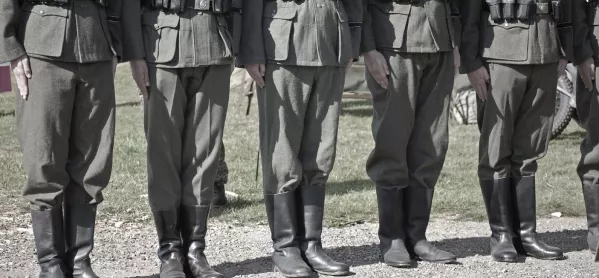‘You know something has gone wrong when you see the history of driving offences on the same syllabus as Nazi Germany’

History has long been one of the punching bags of education policy. Perhaps successive ministers have been keeping in mind George Orwell’s famous dictum that “he who controls the past controls the future”. Or perhaps they just have a random checklist of historical topics they think should be important.
The subject can certainly be divisive. For the progressive left-winger, it seems self-apparently obvious to keep in mind the great movements of history - to understand the rise of labour, the fight for women’s equality, the appalling history of racial oppression. For the conservative, the history of our country and the key individuals who have propelled its development are the crucial element. Either way, the very act of selection becomes political.
There was no more ardent historical interventionist than Michael Gove, late of this parish. He waged war on history teaching (taking to task the highly regarded website Active History), on history content and even on the specific teaching of such events as the First World War. Mr Gove, an English graduate with no obvious historical expertise, was not slow in bringing his more journalistic skills to bear in his history war.
Sadly, one of the great lessons of history is that he who has power tends to win. Gove had power, and regardless of his own knowledge or fitness to pronounce, he won. History teaching is in the process of changing again. Mr Gove’s legacy is the mess that has become the proposed new GCSE history specifications.
You know something has gone seriously wrong when you see the history of driving offences and the neighbourhood watch on the same syllabus as Nazi Germany. This is, however, one of the potential combinations being offered by one of the three exam boards.
The most popular pre-Gove GCSE course was that of the modern world. Generally, this took an overview approach to the 20th century, and added depth by considering two or three areas within the period in more detail. It was coherent and enjoyable. It enabled students to make sense of the world they live in while offering a coherent narrative through the period.
Contrast that with the new offerings. With the same timetable allocation, history teachers must now cover an in-depth study of a major world power, a thematic study of a period in international relations, an in-depth study of an era in British history and a long overview of another British history option. The long overviews (we’re talking 1,000-year overviews here) tend to be the history of health, or crime, or migration in Britain from medieval times to the present. Incoherent, certainly. Messy, without a doubt. Impossible to teach properly within the timetable constraints of GCSE history - absolutely. Goodness knows how this is going to be examined. How do you get a good exam from a topic that encompasses medieval torture and driving offences?
All this is bad enough, but the other serious charge against the new GCSE is that it is hugely repetitive. The emphasis on British history replicates the emphasis on British history in both Key Stage 3 and at A-level. It is impossible to avoid repetition in the new make-up. I love the history of our nation, but if I were a student being offered yet another look at Tudor England or the Normans, having covered them in Years 7-9, and probably at primary school as well, I might just decide to opt for some fresh educational pastures in another subject.
Interestingly, there is one option for the despairing teacher of Key Stage 4 history that maintains the coherence and interest of the previous course. That is the IGCSE. But herein; a mystery. In 2010 the government accepted the view of an increasing number of schools, that IGCSEs were “respected and valued qualifications”. They allowed state schools to join independent ones in offering IGCSE qualifications instead of the standard British GCSE. Then in 2014 they carried out a U-turn. The IGCSE hadn’t changed. But the government refused to allow them any longer to be counted in school league tables. The Cambridge board who offer the IGCSE said there was no educational justification whatsoever for doing this.
So why the apparent change of heart? Could it be that Mr Gove and the Department for Education were already aware of the unpopularity of their new specifications and wanted to head off a major exodus as quickly as possible? It turns out that consumer choice isn’t always the key factor for a Conservative, no matter what the rhetoric.
The new-style GCSE could mark a major falling off in the study of school history as teachers struggle to make these specifications appealing. Perhaps it is time for a new insurrection. The IGCSEs are still in place and still offer a strong course. Forget the league tables and do what’s right for students.
My own department has decided to weather the storm, with the support of the headmaster and governors. We believe our school’s history course will remain strong as a result, something we can’t guarantee with the new regime. We’ve been gratified to see that we’re not the only ones and can only hope that more history departments will vote with action rather than succumb to the nonsense of the Govian agenda.
Perhaps we can prove that people power can still change the path of history.
Giles Marshall teaches history in a London grammar school
Keep reading for just £1 per month
You've reached your limit of free articles this month. Subscribe for £1 per month for three months and get:
- Unlimited access to all Tes magazine content
- Exclusive subscriber-only stories
- Award-winning email newsletters